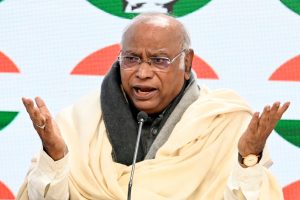Was Prime Minister Imran Khan serious when he talked of improvement in India-Pakistan relations? He said quite sensibly that the only way to remove poverty in the subcontinent is to improve trade relations. Then why did he change his position when an opportunity came along? After the Cabinet meeting of 1 April, Foreign Minister Shah Mahmood Qureshi said in a video message that the Cabinet discussed the issue of cotton and sugar imports from India.
An impression was being created, he said, that “relations with India have become normal and trade has been restored”. But this was not true as “the Prime Minister and the Cabinet had a consensus opinion that until India reviewed the unilateral actions of 5 August 2019, it would not be possible to normalise ties with India.” Will this volte face create the ‘enabling environment’ for a constructive dialogue between India and Pakistan for resolving all outstanding issues, including Kashmir?
The 25 February ceasefire agreement between the DGMOs was certainly the right step towards the reduction of violence and tensions between the two countries but a mere ceasefire will not lead to normalisation of relations unless other measures are taken ~ the restoration of diplomatic ties at the level of High Commissioners, trade and commerce, and people-to-people contacts through the opening up of channels of communications, cessation of high decibel jingoistic rhetoric and, of course, an end to cross-border terrorism.
It seems Prime Minister Khan failed to convince his Cabinet colleagues, particularly, the hardliners, that resumption of India-Pakistan trade relations need not be conditional on the restoration of Article 370 which, after all, is India’s internal matter. When he talked about improvement in India-Pakistan relations was he really serious, or was merely trying to gauge the extent of political support he would get for such a move?
In India there are many, including the present writer, who have been critical of the way New Delhi’s ruling dispensation decided to abrogate Jammu and Kashmir’s special status; but that in no way justifies Pakistan’s bellicosity as seen in the aftermath of the 5 August 2019 decision of the Indian government nor does it justify the position taken by the Pakistan Cabinet on 1 April. If the Prime Minister failed to get the support of his Cabinet colleagues, what guarantee is there that his moves will be supported by his political opponents?
There can be no denying the fact that Kashmir has been the main stumbling block to the development of friendly relations between the two neighbours and a peaceful settlement of the dispute, through dialogue, will go a long way in normalisation of relations between the two states. But to achieve this, the most important thing would be a change in the mind-set, especially in Pakistan. For generations the Pakistanis have been led to believe that Pakistan remains incomplete without the incorporation of Kashmir. The pursuit of Kashmir remains embedded in popular as well as official imagination, which makes any deviation from that position difficult.
As Zaib-un Nisa Aziz wrote in the Herald in November 2015, there is “a state-driven national narrative” that sees Islam and Kashmir as the two foundational pillars of the state of Pakistan. Even as late as 2015, one could see auto rickshaws in Lahore carrying posters proclaiming that Pakistan has the right to get Kashmir back from India. Politicians of all hues have deliberately stoked the flames for the pursuit of Kashmir, for their own political gains, nay survival. Nawaz Sharif, Imran Khan’s bête noire, declared at a public meeting on 22 July 2016 that the country was waiting for the day when “Kashmir becomes (a part of) Pakistan”.
This came barely seven months after Prime Minister Modi made an unscheduled visit to Pakistan while returning from Afghanistan, as a goodwill gesture, although that raised many eyebrows in India, including of the late President Pranab Mukherjee. Viewed from the perspective of the state-driven national narrative in Pakistan, Kashmir becomes a zero-sum game. But the reality is much more complex. In India, except the jingoistic nationalists, the majority would be prepared to settle for a solution that does not envisage the possibility of India ‘re-uniting’ the whole of the former princely State of Jammu and Kashmir by force, notwithstanding the political rhetoric of some leaders of the ruling party at the Centre in the aftermath of abrogation of Article 370.
Then Prime Minister Jawaharlal Nehru wrote to Sri Prakasa, India’s first High Commissioner to Pakistan, that Kashmir is of utmost vital significance to India as well as to Pakistan. There lies the rub …’ This was a realistic view; unfortunately Nehru himself did not always follow this realistic path. Adversarial relations are hurting both states and attempts should be made to reverse the trend. The Simla Agreement (1972) provided that the Kashmir issue should be resolved through bilateral discussions, and towards the end of the 1980s such a possibility had emerged.
According to a PTI report, Asif Ali Zardari, a former President of Pakistan, claimed in February 2018 that Rajiv Gandhi and Benazir Bhutto talked in 1990 and agreed to resolve the Kashmir issue amicably, but Rajiv was assassinated in 1991 during an election campaign. In April 2009, India’s Prime Minister Manmohan Singh told a US delegation led by the then Chairman of the House Foreign Affairs Committee, that during General Musharraf’s tenure as the President of Pakistan, Islamabad and New Delhi had made great progress in finding a non-territorial solution of the Kashmir dispute, that included free trade and movement of people across the LoC.
The Indian Prime Minister’s comments were confirmed by Musharraf in 2010 when he asserted that India and Pakistan had reached the stage where they were preparing for the final draft of the resolution spelling out the terms of settlement. But the move was abandoned because, as Asif Ali Zardari asserted later, the Pakistani Army top brass did not approve of it. After the attack on Mumbai by Pakistan-based terrorists in December 2008, India-Pakistan relations reached a new low and the Kashmir issue was put on the back burner.
After Benazir, the next PPP government in Pakistan (2008-13) had also taken up the issue with Prime Minister Manmohan Singh, claimed Zardari though there is no evidence to show that any serious attempt had been made towards that end. The two leaders met in New Delhi in 2012 and discussed the need for improvement in bilateral relations between the two states, through development of trade and commercial links and resolution of the Kashmir problem.
Neither Manmohan Singh nor Zardari was then in a position to take decisions on such a sensitive issue as Kashmir, given their own domestic problems.
Prime Minister Modi has a huge parliamentary majority and also enjoys support within his own party and, therefore, can take bold decisions. The position of Imran Khan is, however, different because of the stiff domestic opposition he has been facing on a whole range of issues, though on the Kashmir issue he seems to enjoy the support of the Army, if General Bajwa’s recent utterances are any indicator.
During the Simla conference of 1972, India was in a very strong negotiating position and wanted a permanent settlement of the Kashmir issue by converting the ceasefire line into an international boundary, with minor changes, but Pakistan baulked. President Bhutto said this would not be acceptable to the people of Pakistan smarting under the trauma of the humiliating military defeat and urged Indira Gandhi not to press for it.
So the ceasefire line in Jammu and Kashmir had been converted to a LoC, pending the final settlement of the problem. Bhutto promised, however, to take up the issue at the appropriate time, which he never did. It is important to note that the remarkable improvements in India-Pakistan relations during 2003-2007 were the result of sustained efforts made by the government earlier, under the leadership of Atal Behari Vajpayee, starting with his Bus Trip to Lahore and the Lahore Declaration, to underline the point that India desired friendship with Pakistan by encouraging peopleto-people contacts and communications, and was committed to the settlement of the Kashmir problem through bilateral discussions.
Manmohan Singh pursued a similar policy and established a degree of trust in dealings with Pakistan. During 2003-2007, the improvements in India-Pakistan relations were made possible by the ceasefire agreement and encouragement of contacts between the people of Kashmir living on either side of the LoC, by opening up trade across the LoC. Back-channel diplomacy did play a significant part in all these developments.
For normalisation of relations between India and Pakistan, mutual trust has to be built through incremental changes, before moving on to the Kashmir issue, and sustained efforts have to be made by both sides, without the glare of publicity and with the cooperation of the people of Jammu and Kashmir. On the Kashmir issue, Nawaz Sharif reportedly said on 26 December 1991: “We will have to give up something, India will have to step back, Pakistan will have to step back, and so will the Kashmiris.” That was a realistic statement but will the politicians on the two sides be able to act accordingly?
(Concluded)
(The writer is Professor (retired)of International Relations and Dean, Faculty of Arts, Jadavpur University)










